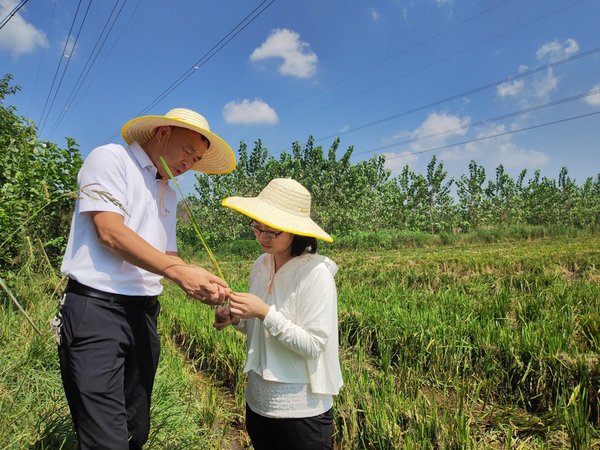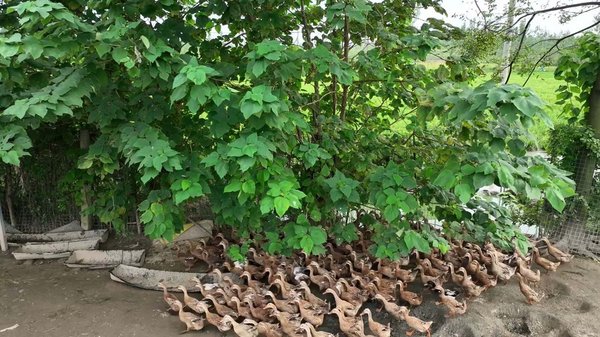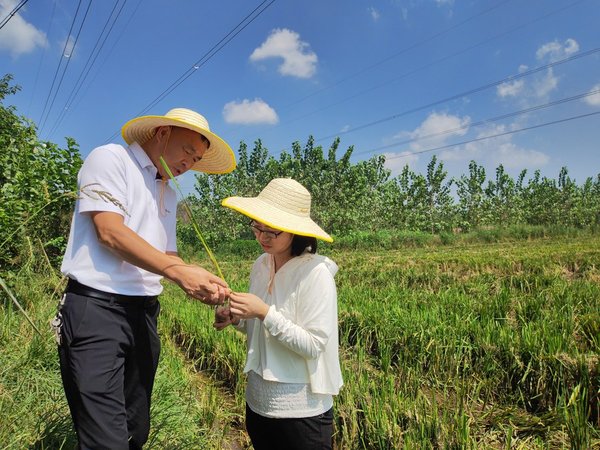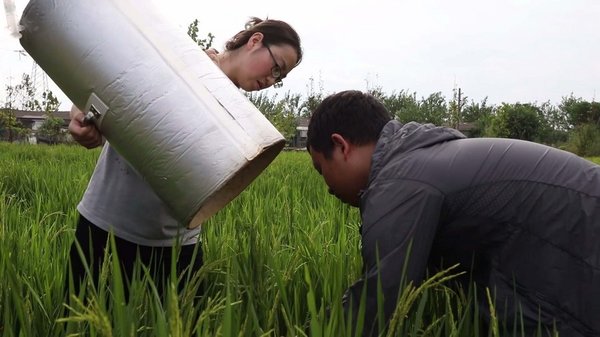How China's Grassroots Tech Centers Nurture Agricultural Innovation
 |
| Click the photo and watch the video. |
* Far away from cities and universities, many rural sci-tech stations are stationed by agronomy students who impart latest technologies to Chinese farmers while conducting field research there.
* There are more than 1,000 such grassroots facilities across China, contributing to the proliferation of agricultural technologies and aiding in the battle against poverty.
WUHAN, Sept. 24 (Xinhua) — Nearly a month into the new semester, Du Chanchan, a PhD candidate at Huazhong Agricultural University, is rarely spotted on the university campus in Wuhan, capital of central China's Hubei Province.
Du, who majors in crop cultivation and farming system, is busy growing rice and breeding ducks at a ratoon rice sci-tech station in Guohe Town in the city of Xiantao, nearly 150 kilometers away from her university.
"I had never seen paddy or live ducks before I started my postgraduate study," said Du, who grew up in a mountainous area of northwest China's Gansu Province, where sorghum is the main crop.
"Now I can tell the types of rice by taste and raise thousands of ducks at the same time," she said, emerging from a paddy of swimming ducks, whose excrement serves as natural nutrients for the crops.
During the past five years, the 28-year-old student spent over 300 days a year at the sci-tech station exploring the co-culture system of ratoon rice and duck, an agricultural technique that can boost crop yield with minimal environmental impact.
 |
| This photo taken on Sept. 18, 2023 shows ducks raised at the experimental field of a ratoon rice sci-tech station in Xiantao City, central China's Hubei Province. [Photo by Zhang Yu/Xinhua] |
"I've been far away from the bustling metropolis in recent years, but I think it's more than worth it," said Du, whose research has helped increase the yearly earnings of local farmers by more than 45,000 yuan (about 6,200 U.S. dollars) per hectare, while reducing the use of pesticide and fertilizer.
Earlier this month, her article analyzing how the co-culture system affects crop productivity and greenhouse emissions was published in the European Journal of Agronomy, making it possible for this knowledge to benefit farmers globally.
The sci-tech station where Du works was founded 10 years ago by an ex-serviceman. Now it has evolved into a bridge connecting agronomy students needing field research and farmers lacking access to advanced technologies.
There are more than 1,000 such rural sci-tech centers across China, contributing to the proliferation of agricultural technologies and aiding in the battle against poverty.
China's total grain output set a new record of 687 million tonnes in 2022 and remained above 650 million tonnes for eight consecutive years, according to the National Bureau of Statistics.
The continuous bumper harvests have highlighted the role of agricultural sci-tech promotion in increasing grain yield, which is likely to reach 694 million tonnes in 2023.
"In recent years, grassroots tech centers have worked together with government authorities and research institutes to greatly reduce the time it takes for agricultural technologies to translate into productive outcomes," said Huang Jianliang, a professor of agronomy at Huazhong Agricultural University.
 |
| Wang Weibin (L), the founder of the Xiantao ratoon rice sci-tech station, and Du Chanchan, a PhD candidate at Huazhong Agricultural University, check the growth of ratoon rice in Xiantao City, central China's Hubei Province, Aug. 23, 2023. [Xinhua/Yue Wenwan] |
Down to Earth
Wang Weibin, the founder of the Xiantao station, left the military and started farming in 2008. Concerned about the limited farming skills and low incomes of local farmers, despite the fertile lands, he decided to pursue a master's degree in agronomy at Huazhong Agricultural University to find a solution.
There, Wang came up with the idea of inviting scholars and well-educated students to help improve the farming techniques of villagers, most of whom have only attended middle schools.
"I've seen how farmers are in need of science and technology, while many research findings are confined to papers and labs," said Wang. "The idea is to turn professors into farmers, and farmers into professors."
His proposal quickly gained support from professors at the university. "Agricultural researchers must pass the test of the soil. Only in the farmlands can we identify urgent problems facing agriculture and find their solutions," said Huang, an early supporter of the initiative.
But many farmers were initially skeptical of the visiting "intellectuals."
"I thought they were only here to experience a different life. I couldn't believe that these young people who seemed so detached from the soil could till land well," recalled Wei Tianhua, a farmer from Zhongling Village in Guohe Town.
The students quietly settled down on Wang's contracted land, growing a new ratoon rice. Their first crop grew so well that many curious farmers, including Wei, came to seek their advice and started to grow the same variety under the guidance of the students. The initiative proved to be a big success, and Wei's income has since increased fourfold.
Besides agronomy students, the sci-tech station has in recent years attracted scholars from various backgrounds, such as engineering, computer technology, bioengineering and economics.
"Apart from agricultural techniques, we can learn about policies, management and industrial chains related to agriculture here, as well as the real situation of the countryside and farmers, which can hardly be learned through books," Huang said.
 |
| Du Chanchan (L), a PhD candidate at Huazhong Agricultural University, and her classmate collect gas for testing in an experimental field at a ratoon rice sci-tech station in Xiantao City, central China's Hubei Province, Sept. 18, 2023. [Xinhua/Pan Zhiwei] |
Bucking Brain Drain
With Du set to graduate in a year, her junior fellow students have come to the sci-tech station to continue the research. Zhou Lewei and Hu Luanluan, both post-graduate students, are trying to grow mushrooms with rice stalks to help farmers generate income in winter, while some other students are studying the co-culture of ratoon rice and rape.
As of now, the station has promoted 27 new agricultural technologies and solved over 150 problems related to farming and breeding. It has conducted 160 free lectures and training sessions, imparting agricultural technology and skills to over 20,000 farmers from across the city.
Zhou Shiwen, deputy Party chief of Guohe Town, said the ratoon rice-duck co-culture model in the village has already been introduced in nine towns in Xiantao.
According to data from the Ministry of Education, from 2009 to 2020, such sci-tech stations served nearly 600 poverty-stricken villages and more than 170,000 impoverished villagers. Over 800 professors and scholars, as well as more than 1,500 postgraduate students, contributed to the work of the sci-tech stations.
China's rural areas have long suffered from brain drain due to the exodus of young people to bigger cities, but grassroots tech centers have injected fresh vitality into the countryside, helping raise the country's contribution rate of agricultural sci-tech progress from 54.5 percent in 2012 to 61.5 percent in 2021.
"Due to their limited numbers, these tech centers may not have fully solved the shortage of technological talent in rural areas, but they have offered a promising solution," Huang said. "We hope in the future, every town in China will have such facilities, and scientists can travel around the country to assist farmers during harvest seasons."
Video reporters: Pan Zhiwei, Yue Wenwan;
Video editors: Zhang Yucheng, Yin Le, Zhou Sa'ang, Hong Yan
(Source: Xinhua)
Please understand that womenofchina.cn,a non-profit, information-communication website, cannot reach every writer before using articles and images. For copyright issues, please contact us by emailing: website@womenofchina.cn. The articles published and opinions expressed on this website represent the opinions of writers and are not necessarily shared by womenofchina.cn.






.jpg)

 WeChat
WeChat Weibo
Weibo 京公网安备 11010102004314号
京公网安备 11010102004314号